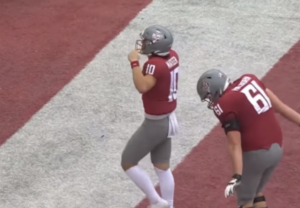
Now bowl eligible, Cougs hang onto narrow path to CFP
More Murrow News Stories PULLMAN, Wash — Washington State University football is bowl-bound after their latest win, moving them to an impressive 6-1 record. Now this guarantees WSU a spot



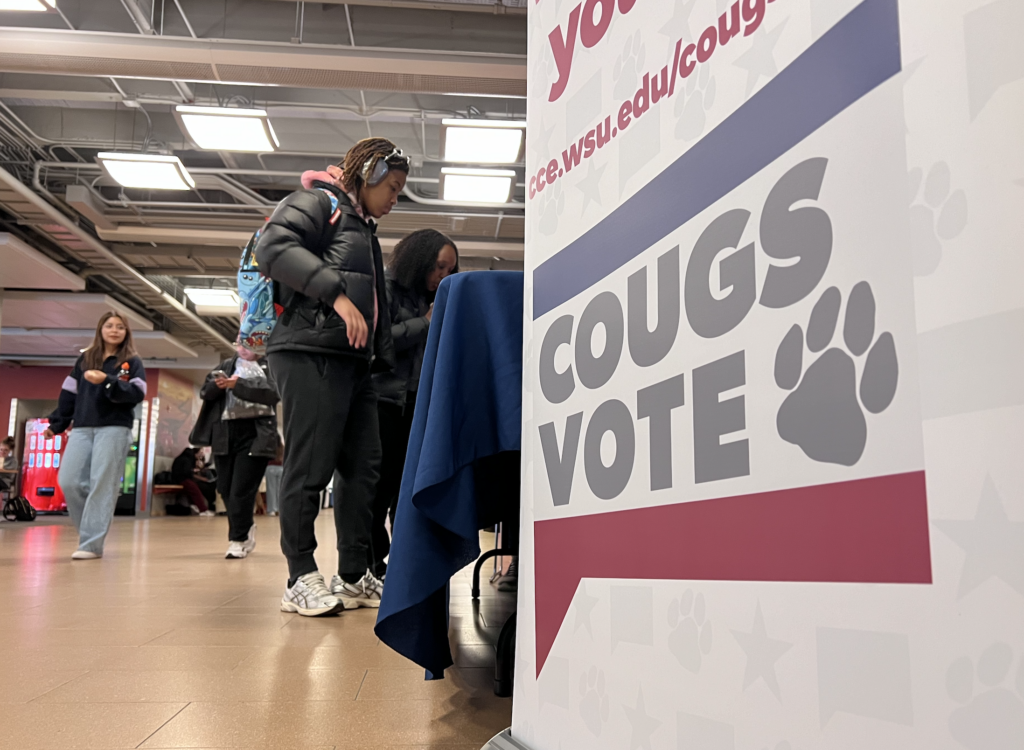
PULLMAN, Wash. (Murrow News 8) — From “brat summer” to “cooking” in an interview with Bloomberg, Gen Z messaging has entered the political conversation.
Vice President Kamala Harris and former President Donald Trump are making a final push for the estimated 41 million potential voters in Generation Z, a group loosely defined as being born between the late 1990s and early 2010s.
That puts students on the Washington State University campus squarely in the target audience of this latest campaign strategy, but is it working?
After a 2020 election that brought out young voter turnout at record numbers, new surveys suggest a backslide in 2024 amid mistrust in mainstream news and what may best be described as “election fatigue.” Young voter registration rates are lagging behind their 2020 pace.
According to a recent CNBC poll, just 21% of Americans aged 18-34 are “excited” about the choice between Harris and Trump, while 38% said they were “disappointed.”
For Nolan Meyer, a mechanical engineering major at WSU, the divisiveness of the campaigns has led to a lack of trust in what he sees on TV.
“They all say the same thing about the other party,” said Meyer. “Everyone’s arguments about why the other party sucks is the same.”
“Whatever side you are on will give you too much of one side and it’s just making a lot of people divided,” said Cole Findlay, a WSU senior. “I would say it is concerning, and I try to have a middle ground point-of-view. The media makes me not understand how anyone could vote for the other side.”
“Watching the news on TV just gives me anxiety,” said Rachel Turcotte, a junior at WSU. “I like hearing it from other peoples’ perspectives that are more towards my age range.”
Students also list cost, convenience, and time for reasons they aren’t seeking mainstream media for their coverage.
Campaigning through podcasts, social media
“I get most of my information from social media and sometimes don’t feel the need to look further into it,” said WSU sophomore Gary Michael.
It’s no surprise that young adults are finding their news and election information on social media, whether they’re looking for it or not. A trend report from the Pew Research Center found that social media was the primary news source for people under the age of 34 for the first time ever in 2024.
“It’s quicker and more accessible, especially when I’m busy,” said Ryan Downing, a WSU senior. “Platforms like Instagram or Twitter offer updates that are pretty easy on the go.”
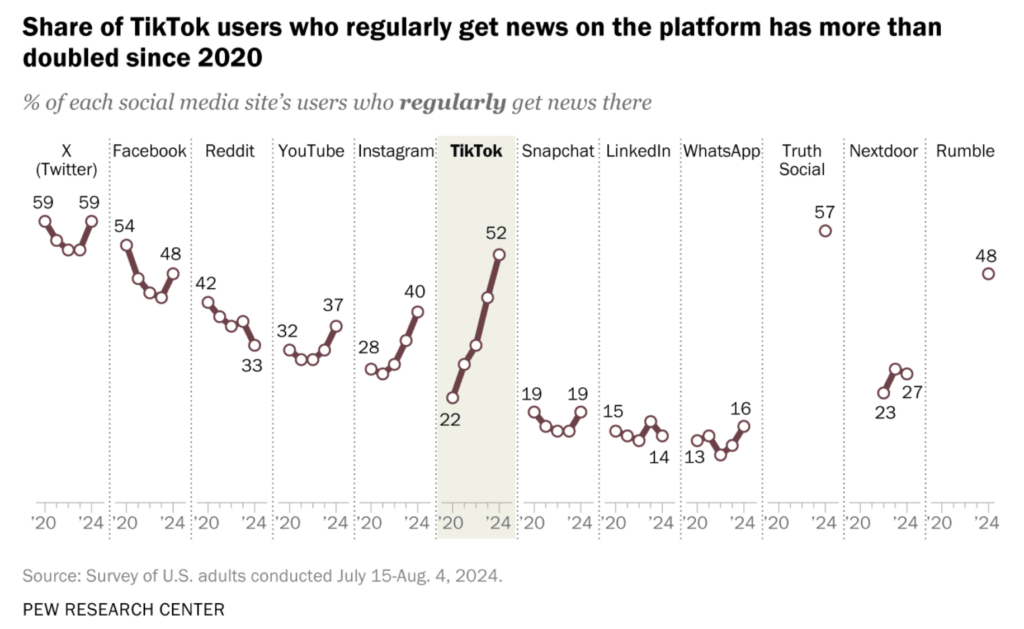
An August report showed more than half of TikTok’s users (52%) regularly get news there. Among social media sites, that number now outpaces Facebook (48%) and is second only to X (59%).
The campaigns are aware of the research and, in between stops at key swing states, are targeting Gen Z in the final push to election.
They’re also turning to people like podcasters Theo Vaughn and Alex Cooper. Those two names aren’t likely known to a vast majority over the age of 40, but wildly popular among Gen Z, and now entering the political fray.
In August, Trump appeared on Vaughn’s “This Past Weekend” podcast, a conversation that included a mix of MMA fandom, health care policy, and Vaughn’s recovery efforts from drug and alcohol addiction. Sen. JD Vance, Trump’s running mate, also sat down with Vaughn for a 2-hour conversion just two weeks ahead of Election Day.
Harris countered with an October appearance on Alex Cooper’s “Call Her Daddy” podcast. Cooper, 30, hosted the 46-minute interview that largely focused on reproductive rights and Harris’ stance on abortion. Running mate Tim Walz is making the podcast rounds as well, sitting down with the “Smartless” hosts in an episode released October 21.
Much of what happened in these interviews has been distilled into short clips on social media. There’s an awkward exchange between Vaughn and Trump about Harris’ ability to roller skate in which Trump appeared to want the interview to end. Harris can be seen in clips responding (see: “clapping back”) to comments about Vance’s July quote that “childless cat ladies” were trying to run the country.
Perhaps the most famous viral moment of this election cycle came from the Sept. 10 presidential debate, in which Trump claimed Haitian immigrants were eating dogs and cats in Springfield, Ohio, a claim that’s been unverified, and often debunked by city officials in the Midwestern community. Search for the clip on TikTok or Instagram and you’ll find song remixes and trendy dances.
Ask any number of potential young voters, they’ll say they remember little, if anything else from that debate.
“Honestly, I don’t think I could fully articulate the plans from each candidate about specific policies,” said Ryan Downing, a WSU senior.
The “meme-ification” of the 2024 election
For the youngest generation of voters, they notice the quality and tone of the political coverage on their timelines, and the result is a disengaged, distracted, and disappointed generation.
“I don’t like the coverage of this election. It’s embarrassing and unserious,” said WSU senior Ani Schauck, noting the candidates’ podcast appearances. “If this is how they need to appeal to Gen Z, then maybe Gen Z shouldn’t be voting.”
“I don’t really like to look at it just because it makes me so mad,” said Callie Highley, a WSU junior.
For many, political engagement taking the form of entertainment has led to election fatigue, as some said they prefer their scrolls through TikTok to be an exercise in escapism. A side effect of that is a lack of interest in, and knowledge about, down ballot races.
“I don’t know any,” said one student, when asked about the races not involving the U.S. presidency.
That leaves a number of first-time voters in the state of Washington, which has voted for the democratic presidential candidate each year since 1988, feeling like there’s little reason to stop by the ballot box.
“I just don’t think that my vote makes a difference,” said Harrison Rothschiller, a senior business major. “Both candidates seem like more of the same, and neither of them actually address what we need.”
“I think these two candidates are too extreme,” said Alex Madsen, WSU senior communication major. “I don’t align with either of them, so I’m not going to vote.”
That’s not to say some of the messaging isn’t seeping through, as young voters do have priorities in this election, including issues of student debt, the economy, reproductive rights, and the Israel-Hamas conflict.
Others are buying into candidates’ messaging about the importance of the election.
“I think this is one of the years where we actually have a negative repercussion if we don’t, or the wrong person gets elected,” said Findlay.
As with any college group project, and a deadline still days away, some are still giving themselves time to finish the homework – and weighing whether or not they feel like turning it in.
WSU sophomore Daisy Preciado knows there’s still “time to learn.”
”I still need to do some research on both sides so that will determine if I vote or don’t vote (for) any party,” she said.

More Murrow News Stories PULLMAN, Wash — Washington State University football is bowl-bound after their latest win, moving them to an impressive 6-1 record. Now this guarantees WSU a spot
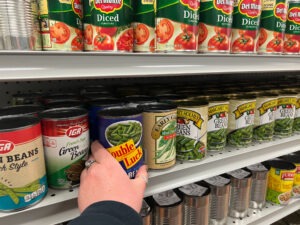
More Murrow News Stories PULLMAN (Murrow News 8) – With many students experiencing food insecurity, Washington State University’s food pantry, located on the first floor of the Compton Union Building
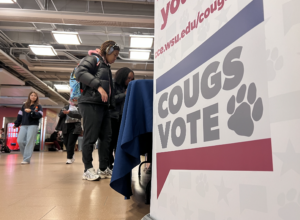





Note: Murrow News is produced by students of the Edward R. Murrow College of Communication at Washington State University. Northwest Public Broadcasting proudly supports the work produced by these young journalists.
If you have any issues/concerns please feel free to reach out to Instructor, Matt Loveless or Department Chair, Ben Shors.
©2022 Washington State University Board of Regents – Edward R. Murrow College of Communication.






